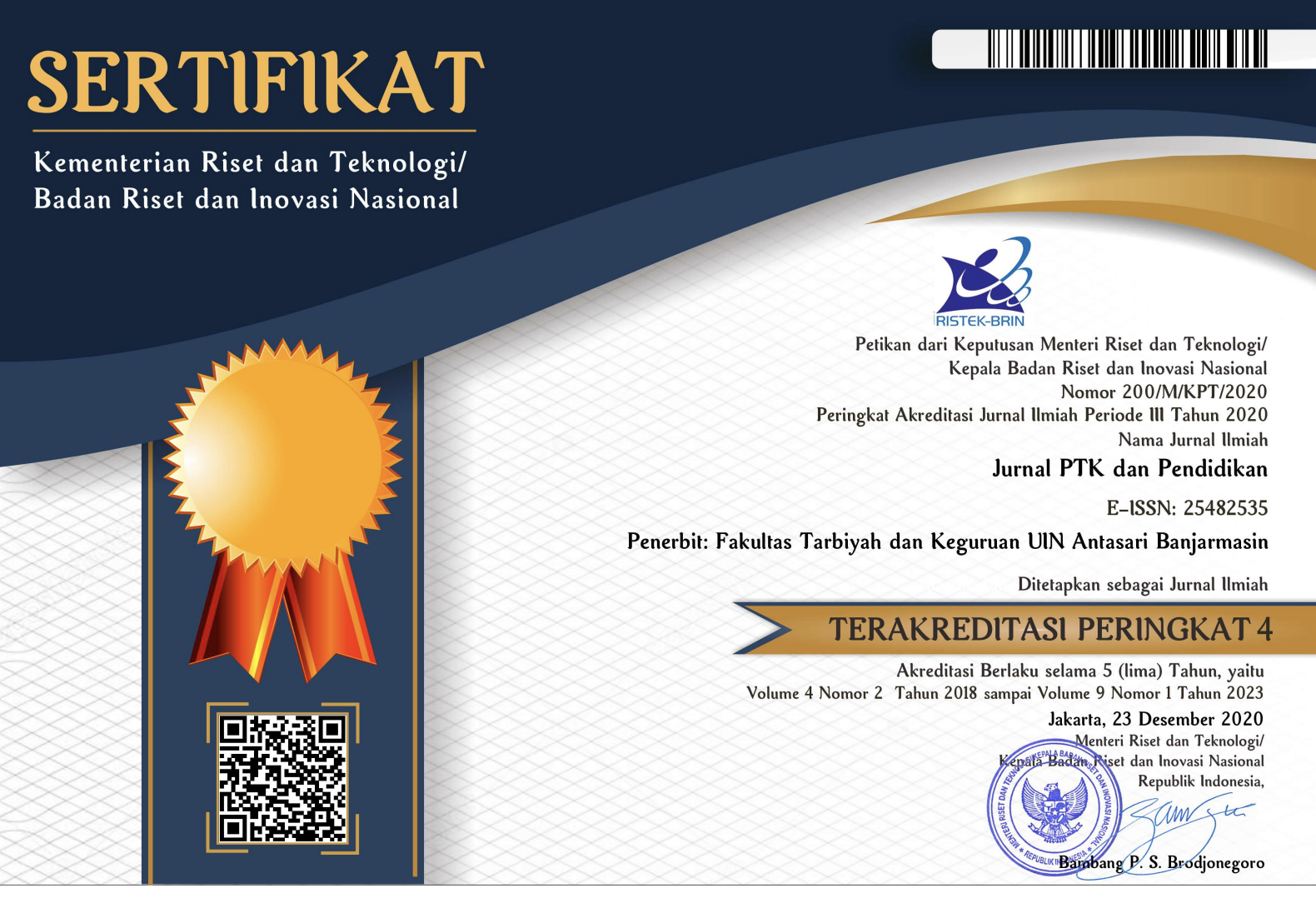Karakteristik Antisipasi Eksploratif Siswa SMK dalam Memecahkan Soal Geometri Dimensi Tiga
DOI:
https://doi.org/10.18592/ptk.v7i2.5491Abstract
Latar belakang penelitian ini adalah kesulitan belajar siswa dalam menyelesaikan masalah geometri dimensi tiga. Tujuan dari penelitian ini adalah mendeskripsikan dan menggambarkan antisipasi eksploratif siswa dalam menyelesaikan soal geometri dimensi tiga. Penelitian ini menggunakan metode tes dan wawancara. Tes tulis dengan soal geometri dimensi tiga berbentuk kubus. Wawancara dilakukan kepada siswa dengan kategori antisipasi eksploratif. Hasil dari penelitian ini adalah (1) Siswa membaca soal lebih dari satu kali, (2) Siswa menemukan hal yang ditanyakan dan hal yang diketahui, (3) Siswa menguraikan soal secara rinci, (4) Siswa menghubungkan kriteria-kriteria yang diketahui, dan (5) Siswa memecahkan soal dengan mempertimbangkan alternatif penyelesaian.References
Ananda, E. D., & Khabibah, S. (2021). MATHE dunesa. Jurnal Ilmiah Pendidikan Matematika, 10(1), 45–58.
Arifin, Yusmin, E., & Hamdani. (2017). Analisis Kesulitan Belajar Siswa pada Materi Bangun Ruang Sisi Lengkung di SMP. Jurnal Pendidikan Dan Pembelajaran (JPP), 6(4), 1–13.
Faizah, S. (2016). Kemampuan spasial siswa smp dalam memecahkan masalah. Ed-Humanistics, 01(01), 67–77.
Lim, K. H. (2006). Characterizing students’ thinking: Algebraic, inequalities and equations. Proceedings of the 28th Annual Meeting of the North American Chapter of the International Group for the Psychology of Mathematics Education, 2(c), 102–109.
Lim, K. H. (2007). Improving Students’ Algebraic Thinking: the Case of Talia. Proceedings of the 31 Conference of the International Group for the Psychology of Mathematics Education, 3, 193–200.
Nur’aini, I. L., Harahap, E., Badruzzaman, F. H., & Darmawan, D. (2017). Pembelajaran Matematika Geometri Secara Realistis Dengan GeoGebra. Matematika, 16(2), 1–6. https://doi.org/10.29313/jmtm.v16i2.3900
Siswono, T. Y. E. (2008). Model Pembelajaran Matematika berbasis Pengajuan dan Pemecahan masalah untuk Meningkatkan Kemampuan Berpikir Kreatif. Surabaya: Unesa University Press.
Usiskin, Z. (1982). Van Hiele Levels and Achievement in Secondary School Geometry. Chicago: University of Chicago. Retrieved from https://files.eric.ed.gov/fulltext/ED220288.pdf
Von Glasersfeld, E. (2019). Anticipation in the constructivist theory of cognition. Key Works in Radical Constructivism, 231–239. https://doi.org/10.1163/9789087903480_022
Wardhani, I. S. (2020). Geometri dan Permasalahannya dalam Pembelajaran Matematika di Sekolah (Suatu Penelitian Meta Analisis). Prosiding Seminar Nasional Integrasi Matematika Dan Nilai Islami, 3(1), 124–129.
Widodo, S. A., & Sujadi, A. . (2017). Analisis Kesalahan Mahasiswa Dalam Memecahkan Masalah Trigonometri. SOSIOHUMANIORA: Jurnal Ilmiah Ilmu Sosial Dan Humaniora, 1(1), 51–63. https://doi.org/10.30738/sosio.v1i1.518
Yaumi, M. (2012). Pembelajaran Berbasis Multiple Intelligences. Jakarta: PT. Dian Rakyat.
Yudianto, E. (2016). Profil antisipasi mahasiswa dalam menyelesaikan masalah integral berdasarkan interpretasi, prediksi dan ramalan. Prosiding Seminar Nasional Matematika Dan Pendidikan Matematika, 327–334. Retrieved from http://seminar.uny.ac.id/semnasmatematika/sites/seminar.uny.ac.id.semnasmatematika/files/PM-48.pdf
Downloads
Published
How to Cite
Issue
Section
License
- The right to publication of all journal material published on the Jurnal PTK dan Pendidikan website is held by the editorial board with the author's knowledge (moral rights remain the property of the author).
- The formal legal provisions for access to digital articles of this electronic journal are subject to the terms of the Creative Commons CC BY 4.0 DEED Attribution International (CC BY) license. This license enables reusers to distribute, remix, adapt, and build upon the material in any medium or format, so long as attribution is given to the creator. The license allows for commercial use.
- Printed and electronic published manuscripts are open access for educational, research and library purposes. In addition to these objectives, the editorial board shall not be liable for violations of copyright law.






